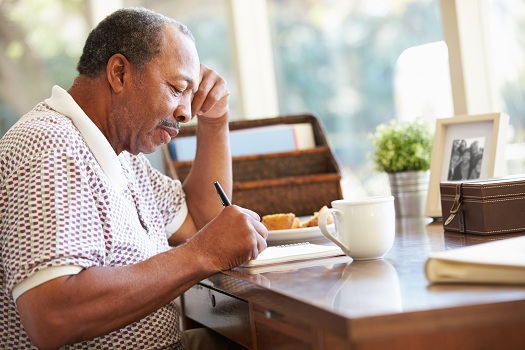A large percentage of senior stroke survivors will have some degree of memory loss, but the good news is the cognitive problems may be reversible. Following a healthy diet, developing a good exercise routine, and taking up brain-boosting activities could increase your aging parent’s memory and possibly speed up the recovery process. Here are some cognitive exercises older stroke survivors should try.
1. Speech Therapy
After a stroke, many seniors develop a condition known as aphasia. The communication problems caused by this condition affect the ability to understand words and phrases as well as the way they write or speak. Speech therapy is an excellent way to treat aphasia and enhance speaking, reading, writing, and communication skills. There are speech therapy apps your loved one can use on a computer or smartphone, or you can take him or her to visit a speech therapist.
2. Drawing
If a stroke has disrupted your parent’s language centers, drawing can stimulate the brain and build muscle memory. Your loved one will connect the colors to real-life memories, which is great for his or her mental wellbeing. Since many senior stroke survivors have issues with their fine motor skills, you shouldn’t use this activity until your loved one’s strength has returned. Instead of using his or her hands to draw, your loved one can arrange colorful puzzles or put collages together with art pieces.
Certain age-related conditions can make it more challenging for seniors to age in place safely and comfortably, but Anchorage live-in care experts are available around the clock to help seniors manage their health. Whether your loved one is living with dementia or is recovering from a stroke, you can trust the professional live-in caregivers from Home Care Assistance to enhance his or her quality of life.
3. Learning a New Activity
Acquiring a new skill can increase the memory and concentration abilities of senior stroke survivors. Your loved one can learn a new language, sign up for dance lessons, start gardening, take up bird-watching, or learn to play a musical instrument. The objective is to increase brain activity and strengthen short-term memory along with critical thinking skills.
4. Typing
Using smartphones, computers, tablets, and other devices with keyboards can exercise the brain and increase hand-eye coordination. Writing by hand may be difficult in the early stages of recovery, so it may be easier for your loved one to send you messages. When your loved one is using the keyboard, the muscle memory in the hands and fingers are trained to remember spelling and word association, enhancing communication abilities. Regular typing on these devices can restore many of the skills damaged due to the stroke.
Seniors can face a variety of challenges as they age, many of which can be mitigated with the help of professional in-home caregivers who provide high-quality homecare. Trust Home Care Assistance to help your elderly loved one age in place safely and comfortably.
5. Guess What’s for Dinner
Strokes can cause a decrease in the sense of smell, preventing seniors from smelling things like they used to, including flowers and foods. One way to enhance sensory skills is to exercise the brain. You can have your loved one guess what you cooked for dinner by serving items he or she is familiar with. Engaging the brain with different smells works out the brain and boosts reasoning and problem-solving skills. Serving healthier foods can also lower blood pressure levels and reduce the risk of a recurrent stroke.
A professional caregiver can be a wonderful source of information and support for a senior recovering from a stroke. If your elderly loved one needs help maintaining a high quality of life while aging in place, reach out to Home Care Assistance, a trusted provider of Anchorage elderly home care. Our caregivers provide transportation to and from medical appointments and social events, nutritious meal preparation, assistance with daily exercise, and help with everyday tasks like bathing, grooming, and light housekeeping. Call Home Care Assistance at (907) 770-0907 to learn more about our flexible and customizable senior care plans.
